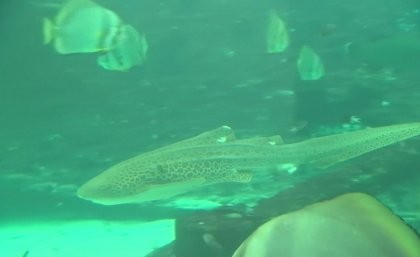By Ana Verayo, | January 19, 2017

Leonie the leopard shark in an aquarium in Queensland, Australia has given birth to pups without any male mate. (University of Queensland)
In a miraculous turn of events, a leopard shark has given birth to babies without a male mate inside its aquarium in Queensland, Australia. Scientists suggest that this could be a crucial step to saving this endangered species.
Researchers from the University of Queensland revealed that "Leonie" is the first recorded shark to transform from a sexual to an asexual form of reproduction.
Like Us on Facebook
According to University of Queensland's School of Biomedical Sciences, Christine Dudgeon, it is possible for sharks to reproduce without a male partner. However, this is the first time that a shark made a change to asexual reproduction.
Dudgeon said that Leonie already had pups with a male leopard shark until 2013 where the mating pair was separated to create more living space at the Reef HQ Aquarium in Townsville, Queensland.
However, in April last year, Leonie suddenly hatched three eggs even though she had no access to any mating partner after three mating seasons. Dudgeon said initially the team thought that Leonie might be storing sperm. However, the pups were tested for DNA evidence of a possible parent shark and revealed that they only possessed cells from Leonie.
Also known as zebra sharks, leopard sharks possess distinct spots that emerge during adulthood on their skin. The leopard shark is listed as an endangered species, and this major discovery can be pivotal in further conservation efforts.
Dudgeon said that Leonie surprisingly evolved and adapted to her current environment and suddenly switched since she lost her mating partner. Scientists are on a quest to find out if this switch occurs in the wild and how often does it happen and under what conditions.
The team now plans to monitor Leonie's offspring until they reach maturity and determine if sharks that are conceived asexually can have pups with a male partner.
Dudgeon noted genetic diversity would get lost after generations of asexual reproduction, in which case, it can be observed if these offspring can mate sexually.
This new study was published in the journal Scientific Reports.
-
Use of Coronavirus Pandemic Drones Raises Privacy Concerns: Drones Spread Fear, Local Officials Say

-
Coronavirus Hampers The Delivery Of Lockheed Martin F-35 Stealth Fighters For 2020

-
Instagram Speeds Up Plans to Add Account Memorialization Feature Due to COVID-19 Deaths

-
NASA: Perseverance Plans to Bring 'Mars Rock' to Earth in 2031

-
600 Dead And 3,000 In The Hospital as Iranians Believed Drinking High-Concentrations of Alcohol Can Cure The Coronavirus

-
600 Dead And 3,000 In The Hospital as Iranians Believed Drinking High-Concentrations of Alcohol Can Cure The Coronavirus

-
COVID-19: Doctors, Nurses Use Virtual Reality to Learn New Skills in Treating Coronavirus Patients







